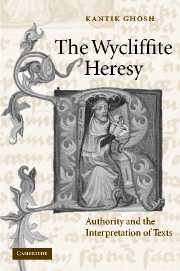Book contents
- Frontmatter
- Contents
- Acknowledgements
- List of abbreviations
- Introduction
- 1 John Wyclif and the truth of sacred scripture
- 2 William Woodford's anti-Wycliffite hermeneutics
- 3 Vernacular translations of the Bible and ‘authority’
- 4 The English Wycliffite sermons: ‘thinking in alternatives’?
- 5 Nicholas Love and the Lollards
- 6 Thomas Netter and John Wyclif: hermeneutic confrères?
- Afterword: Lollardy and late-medieval intellectuality
- Notes
- Bibliography
- Index of names and titles
- General index
- CAMBRIDGE STUDIES IN MEDIEVAL LITERATURE
3 - Vernacular translations of the Bible and ‘authority’
Published online by Cambridge University Press: 22 September 2009
- Frontmatter
- Contents
- Acknowledgements
- List of abbreviations
- Introduction
- 1 John Wyclif and the truth of sacred scripture
- 2 William Woodford's anti-Wycliffite hermeneutics
- 3 Vernacular translations of the Bible and ‘authority’
- 4 The English Wycliffite sermons: ‘thinking in alternatives’?
- 5 Nicholas Love and the Lollards
- 6 Thomas Netter and John Wyclif: hermeneutic confrères?
- Afterword: Lollardy and late-medieval intellectuality
- Notes
- Bibliography
- Index of names and titles
- General index
- CAMBRIDGE STUDIES IN MEDIEVAL LITERATURE
Summary
An emphatic recognition of the power of interpretation – ‘glossing’ – in determining the ‘meaning’ of authoritative texts, particularly the scriptures, and perhaps ‘perverting’ or ‘negating’ them, formed the basis of Wyclif's programme of reform. The dependence of what is understood by ‘faith’ on an ultimately arbitrary hermeneutic dictated by a political-ecclesiastical authority the exact status of which had been always open to question led him and his followers to postulate an unmediated absolute faith as an achievable ideal. A crucial factor in such a faith would obviously be the availability of an unmediated, ‘naked’, Biblical text in an accessible language. This formed the matrix of the Lollard involvement with translation.
Wyclif's theoretical disjunction of human authority and scriptural interpretation provides the context for many of the contemporary disputes relating to issues raised by the Lollard heresy. One of the most significant of these was centred on the validity or otherwise of Biblical translations into the vernacular. Important insights are afforded when one compares a cluster of similar texts written at around the turn of the fourteenth century, before Archbishop Arundel's censorship laws – the Constitutions – drafted in 1407, and promulgated in 1409, categorically prohibited all disputation on this issue. The texts are in the form of academic determinationes; and at least two of them were written at Oxford.
- Type
- Chapter
- Information
- The Wycliffite HeresyAuthority and the Interpretation of Texts, pp. 86 - 111Publisher: Cambridge University PressPrint publication year: 2001



